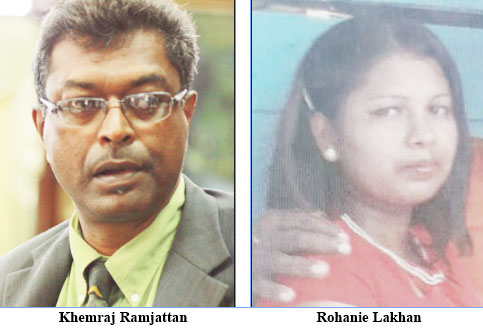There is a need for continuous training sessions for police officers on how to deal with domestic violence cases, to fill the gap in their formal police training, Public Security Minister Khemraj Ramjattan says.
“Policemen again are law enforcement officers and are trained for that. Now, we will have to expand this thing and that is what we are trying to do…There is lots of training going on especially with the women police [on] how to deal with these domestic violence cases. We have men too who are involved in the programme,” Ramjattan told Stabroek News recently.
The police force has had multiple sessions of training in the past from a variety of persons on handling domestic violence cases, but complaints continue about the indifferent response from law enforcers. This has resulted in persons who have made complaints to the police, being maimed or killed by their abusers.
Ramjattan, when asked what it is that the police may be doing wrong, made it clear that them having to deal with this social issue, is a very difficult thing.
“Policemen now got to be doctor…accountant…a social worker too, that knows a thing or two about domestic violence,” he pointed out.
He opined that what may be required, is for recruits to have attained more than just three or four CSEC passes as the minimum requirement for joining the force. According to Ramjattan, because of this, their capacity “might [not be] there in relation to all of these things. We have to get more qualified, educated recruits to join up as cadet officers so that we can place them there.” He acknowledged that with higher qualifications, the provision of salaries may prove to be a challenge.
In August, a Corentyne family filed a complaint against the police after their relative, Rohanie Lakhan, was murdered by her husband after the two were left together by a policewoman who had been deputed by a magistrate’s court to ensure that the woman safely collected her belongings from the marital home. The family said that the officer acted carelessly and contended that if the policewoman had not left the house, the husband, Ramesh Ramdeen, would not have had the opportunity to murder Lakhan. After committing the act, he killed himself. A police investigation has since cleared the officer.
There have been other similar cases, and the police have long been accused of treating these matters as `husband and wife’ business.
After Lakhan’s murder, the Public Security Ministry, under the Inter-American Development Bank-funded Citizen Security Strengthening Programme, advertised for a consultant to train police on responding to cases of domestic violence.
The ministry’s advertisement said that the consulting services include developing a comprehensive training module which addresses the skills and knowledge that would enable the police to “demonstrate the requisite levels of professionalism, empathy, and integrity” when dealing with incidents of domestic violence.
The consultancy also includes the training of 120 police ranks and public officials. The duration of the consultancy is six months.
Human rights activist, Vidyaratha Kissoon, had questioned the rationale for the consultancy given that police had been exposed to training over the years.
In a letter published in this newspaper shortly after the consultancy was advertised, Kissoon pointed out that since the late 1990s, the Canadian – Caribbean Gender Equity Fund started providing exchanges and opportunities for the Guyana Police Force to respond to domestic violence. NGOs like Red Thread and Help & Shelter, he said, were involved in providing resources.
Kissoon informed that the Caribbean Association for Feminist Research and Action (CAFRA), a regional NGO, was involved in a project with the Association of Caribbean Commissioners of Police to provide training and to institutionalise the training for police and other frontline workers. Modules, some of which are still available, he said, were developed for the police training, covering the items which were in the Terms of Reference.
He said that the domestic violence training was embedded in the training at the police training schools but quickly pointed out that things changed, as perhaps the leadership had different priorities.
“Some police like the late Derrick Josiah voluntarily took their knowledge about domestic violence into community settings. The problem is not so much the lack of training and awareness, as the lack of accountability on the part of the Guyana Police Force when dealing with domestic violence. It is easier to fund, organise and implement training sessions. It is more difficult to implement policies and procedures. It is more difficult to ensure that the police are consistently applying what they have learned, and are examining the other attitudes which have to change to successfully intervene in domestic violence,” he opined.
According to Kissoon, Dr Janice Jackson, in a presentation at the 24th Conference of the Association of Caribbean Commissioners of Police in March 2009, proposed several elements in addition to training, which the police should implement. These elements, he said, include the articulation of policies and procedures, the involvement of the police in public education and awareness, treatment for survivors and perpetrators of domestic violence within the police force, and continuous monitoring and evaluation of the police performance.
Her presentation is entitled “Policing Domestic Violence: Context, Status and Prospects”, and can be accessed at http://www.h ands.org.gy/node/118
“Some of these elements do not require donor funds but rather require political will and a serious commitment to transforming the personal attitudes of individuals – especially at the senior level of the police,” Kissoon stressed.
He opined that the government and the Citizen Security Strengthening Programme might have other initiatives to ensure that this “one-off” training is accompanied by some of the other activities needed to ensure that the police are consistently meeting the needs of survivors of domestic violence.






